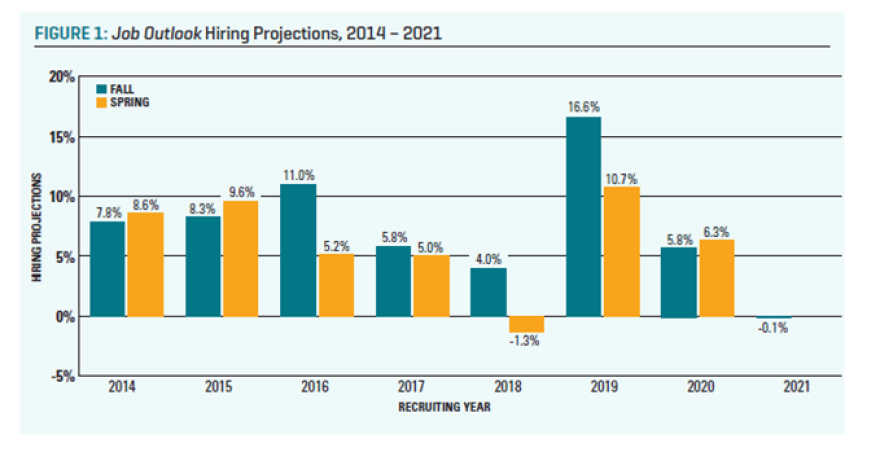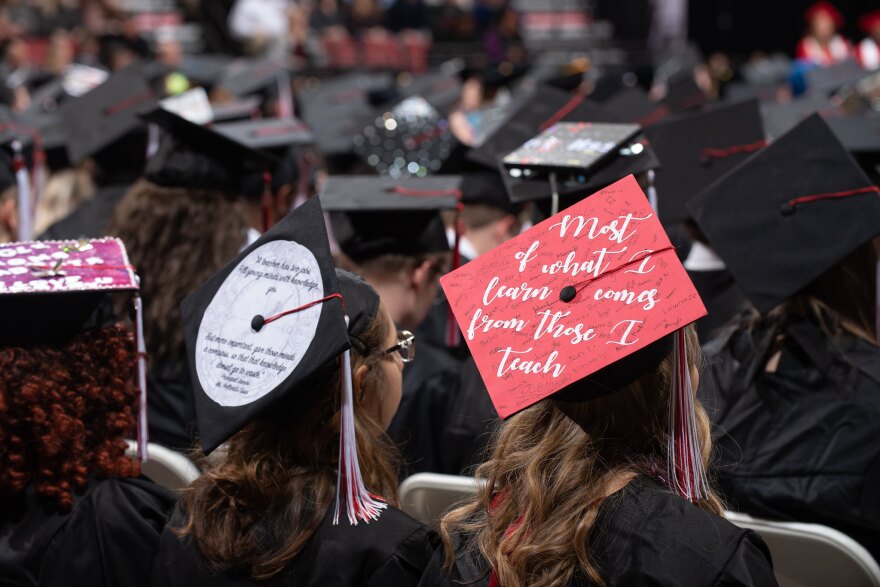A year after the start of the pandemic, a second class of "COVID graduates" is hitting the job market—and they're on better footing than last year's college seniors. The job outlook is on an upswing, and grads say they feel better equipped to navigate the virtual landscape.
Joie Green studies math education at Illinois State University. She's one of more than 3,200 undergraduates planning to graduate in May. Another 650 graduate students at ISU applied for graduation this spring.
Green said like most looking for that first job, she was a little anxious. But it has gone better than expected.
“I went to a career fair, but I haven’t filled out any applications and I’ve already had three interviews," she said.
Green said she feels fortunate. She said math teachers are always in demand. School districts are desperate for staff during the COVID-19 pandemic, she added.
Green said she's also going in without expectations.
“I feel like one of the bonuses of not having had a job before COVID hit is that I’m able to learn and be flexible immediately, instead of having 10-plus years of experience in a classroom and then having to change," Green said.
Claire Wagner, another senior studying mass media and interactive communication, has had slower success on the job hunt.
“I started applying for jobs back in January, when I put out a big message on my LinkedIn. I was like, ‘Hey, I’m open for opportunities if anyone is interested in contacting me.' After that, I started going onto job sites like Indeed, Glassdoor—all the big ones," Wagner said.
In three months, she's had multiple interviews. Wagner said they went well, but nothing has panned out yet.
“In my capstone class, they have a segment where people share their accomplishments that they’ve gotten in the job field so far. I always feel really pressured by that," Wagner said. "Like when people say, ‘Yeah, I’ve already gotten several interviews lined up and I have this position set already,’ and I’m feeling like, ‘Oh no, am I falling behind?’”
Job options for the class of 2021 appear to be pretty stable, compared to last year's graduating class.
Natalie Alexander oversees employer engagement at ISU's student career center.
“Around this time last year, we were getting calls from students and our employers that were rescinding internships, and they were rescinding job offers, and it was pretty sad. But right now, we're hearing the opposite," Alexander said. "It's a small barometer—but it's a barometer, nonetheless, that things are working in the direction that we certainly want them to.”
Alexander said some students are concerned their "dream job" won't be available after the financial turmoil caused by the pandemic. But she said in many cases, the same opportunities exist. They just look a little different.
Many students will do interviews virtually. They may not get to see the workplace or meet colleagues before taking a job offer. Some may only go to the office once, for orientation and to pick up equipment, and then do training from home.
But Alexander said more and more employers say they want to bring new hires in-person. ISU recently added 120 jobs to its student recruitment portal, she said, and 109 of those positions were in-person.
Alexander said she's also seen emergence of some non-traditional opportunities.
“I really think micro-internships are growing and growing and growing," she said. "Micro-internships are usually kind of like gig deals, so they're two- or three-week projects that a company might have: 'Can you do a benchmark on our competitors Twitter feed?' or 'Can you write a white paper on X, Y, and Z for us?' Those are paid."
Still, it should be possible to get full-time gigs. A fall survey from the National Association of College and Employers shows employers plan to hold hiring essentially steady. Andrea Koncz, the nonprofit's research manager, said that's a pleasant surprise for recent graduates.
“We found that it was actually more positive than we thought it would be," Koncz said. "The overall projection was a decrease, but it was only about 0.1%. So employers were still hiring, but they weren’t actually increasing their numbers.”

Koncz said they're still crunching numbers for the spring, but early indicators show employers could soon return to pre-pandemic levels. Hiring was originally projected to be up 6.3% for the class of 2020, before the pandemic hit.
Koncz said some industries are still hurting—hospitality and retail, for example. But there's also an expected boom in areas like technology, computer sciences and pharmaceuticals.
Koncz said recent grads could be competing with more experienced applicants who lost jobs earlier the pandemic. But the fresh bloods often have an edge.
“They’re a lot cheaper to pay than someone with 10 or 20 years of experience," Koncz said. "Not only that, they’re a lot more tech-savvy than some of the ... I don’t want to say older hires, but people with more experience. They just have a different kind of outlook that brings a lot to companies that are trying to build their future leaders.”
Graduates will need to know where to find these jobs and how to network their way into them, often without the advantage of in-person networking.
That's according to Patrick Zajac, assistant director for employer relations for the Hart Career Center at Illinois Wesleyan University.
“I think the key thing is the digital nature, and really how to leverage technology to stand out to employers," Zajac said. "With so many applicants and with all the changes in employment ... simply applying online, where if your resume's with 100, 200, 300 other people, how do you get that resume moved up in the pile of applicants?”
Zajac said applying online is only the first step. He said employers expect to see students go the extra mile with outreach. Connecting with recruiters on LinkedIn won't get them the job, he said, but it could get them an interview.
Zajac said it's also more important than ever to use alumni networks to get a foot in the door. That's something he said has actually gotten easier to do during the pandemic.
"If we were hosting an in-person (alumni) event ... we couldn't necessarily ask somebody out of state to come. But now with the virtual tools, you can really connect with people all over the country—and, in other cases, all over the world—that make those connections."
Zajac also tells students to maintain a personal brand online. That could mean running a blog or professional website on top of active networking.
Above all, he said, flexibility in what kinds of jobs graduates are willing to take will give them a longer list of opportunities.
There's no subscription fee to listen or read our stories. Everyone can access this essential public service thanks to community support. Donate now, and help fund your public media.



